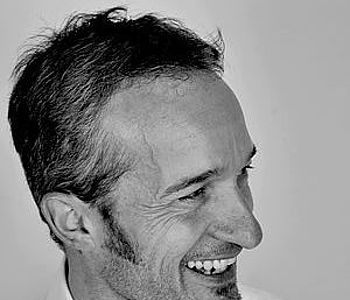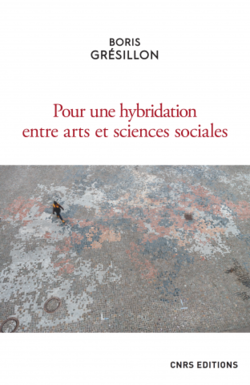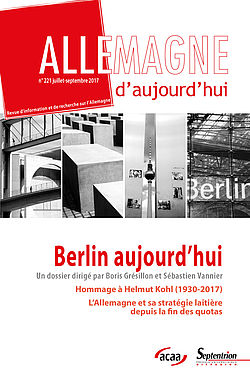Boris Grésillon | Associated Researcher
Former Member
Home Institution
:
Aix-Marseille-Université
|
Position
:
Chercheur associé au CMB et à l´université Humboldt (chaire de géographie culturelle et sociale, professeur Ilse Helbrecht)
|
Disciplines
:
Geography
|
Biography
After studying geography at the Ecole Normale Supérieure in Fontenay St Cloud and at the University of Paris-I, I was an Allocataire-moniteur-normalien at the TU and a doctoral student at the Centre Marc Bloch (1995-2000). I defended my thesis on "Berlin, cultural metropolis - a geographical essay" in May 2000, which was published in French in 2002 (Belin) and in German in 2004 (BWV).
In 2001, I was appointed lecturer in geography at the University of Aix-Marseille, with the UMR Telemme within the Maison méditerranénne des sciences de l'homme as my laboratory. Since then, I have broadened my field of research to include the Mediterranean, while continuing my work on Berlin and Germany. In 2005-06, at the invitation of Professor Etienne Francois, I was a visiting professor at the TU Berlin. In 2010, I defended my habilitation thesis on the theme of 'Cities and artistic creation', and in 2011 I was appointed professor at the University of Aix-Marseille.
I closely followed the organisation of the event 'Marseille-Provence 2013, European Capital of Culture', which gave rise to a research project on European capitals of culture as agents of urban development.
From 2014 to 2016, I was Attaché universitaire at the French Embassy in Berlin, before returning to research at the CMB through a research grant awarded by the Alexander-von-Humboldt Foundation (Sept. 2016-Feb. 2019). This research grant enabled me to begin a long-term reflection on the relationship between artists and researchers, and more generally between the arts and the social sciences [Boris Grésillon, Pour une hybridization entre arts et sciences sociales, CNRS-Editions, 2020, available online at https://books.openedition.org/editionscnrs/32387]. In 2019, together with Etienne Jollet (professor of art history, Univ. Paris-I) and Julio Velasco (artist and art historian), I founded a new multidisciplinary research group at the CMB on the intersections between the arts and social sciences. After a number of seminars, this group was consolidated within the CMB's Pôle 2, under the name 'Arts et recherches'.
Finally, in parallel with this research, I continue to follow German and European current affairs closely, which leads to the regular publication of scientific articles and press reviews. I am also coordinating the 'Allemagnes' volume in the 'Odyssées - Portraits de villes' collection from ENS-Editions, which will be published in 2024.
Since 2019, I have been on secondment from my home university (Aix-Marseille-Université) to the Lycée français de Berlin, where I teach (happily) geography and geopolitics.
Researchtopic
After my dissertation on Berlin métropole culturelle / Kulturmetropole Berlin (2000), I continued to work on Berlin as well as expanding my research focus to other cultural cities (including Marseille, Brussels, Lille) and to other topics (cultural wastelands, artists as actors in the city, ECoC / European Capitals of Culture, creative city, culture and gentrification, etc.).
My current research focuses are as follows:
- first, a theoretical Anstaz with the question of a potential hybridisation between the social sciences and the arts. This has led to a book: Boris Grésillon, Pour une hybridation entre arts et sciences sociales, CNRS-Editions, 2020, available online: https://books.openedition.org/editionscnrs/32387
- secondly, a practical approach with the urban transformations that emerge in some European Capitals of Culture in the course of their process of change, using the examples of Marseille 2013, Lille 2004, Liverpool 2008 or Mons 2015.
- thirdly, a media approach about Germany. Due to my long stays in Germany and my diverse publications about Germany and Europe, I have a certain expertise that is asked for by the media from time to time and that has led and will lead to many articles, reports or press articles (see curriculum vitae / CV).
Institution of thesis
Supervisor
"Capitales européennes de la culture et transformations urbaines"
Art
Edition: CNRS Éditions
Collection: Art
ISBN: EAN électronique : 9782271135469
Ce livre part d’un double constat : les chercheurs en sciences sociales comme les créateurs peinent de plus en plus à saisir et à déchiffrer le monde contemporain dans sa globalité. Le renouvellement de leurs concepts, de leurs méthodes et de leurs pratiques ne suffit plus à assurer leur pérennité. Face à cette impasse, Boris Grésillon propose une piste originale : et si la rencontre, l’entrelacement voire l’hybridation des sciences sociales et des arts leur permettaient de dépasser leurs limites et d’échafauder ensemble de nouveaux protocoles de travail, d’imaginer d’autres problématiques, d’inventer un langage commun ? Et si le pas de deux des arts et des sciences s’avérait scientifiquement fécond ? L’auteur explore cette hypothèse et la soumet à un examen théorique, pratique et opérationnel. Il en ressort un essai foisonnant, basé sur un corpus renouvelé autant que sur des récits concrets de rencontres fructueuses entre artistes et chercheurs.
L'auteur : Boris Grésillon
Boris Grésillon est géographe de l’art et chercheur en sciences sociales, professeur à l’université Aix-Marseille. Il a déjà publié, sur des thèmes voisins, Berlin, métropole culturelle (Belin, 2002) et Géographie de l’art (Economica, 2014).
Collection: Allemagne d'aujourd'hui
ISBN: 2757415956
Ce dossier sur « Berlin aujourd'hui » porte sur la vitalité économique et culturelle de la ville de Berlin aujourd'hui sur fond d’histoire et de travail de mémoire. Il éclaire les évolutions de la ville en une grande métropole urbaine depuis l’unification et intègre une réflexion sur l’impossibilité d’une réforme territoriale qui aurait pu conduire à la fusion des Länder de Berlin et du Brandebourg et comment, sans fusion, les deux Länder coordonnent ou pas leurs politiques.

